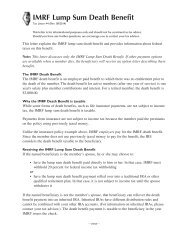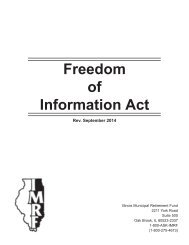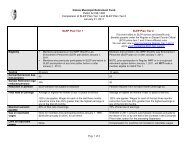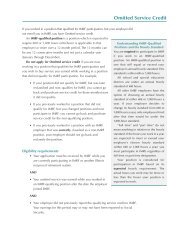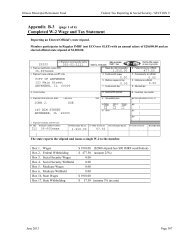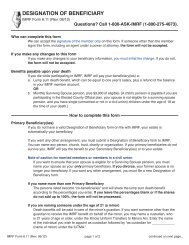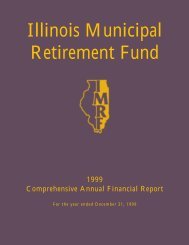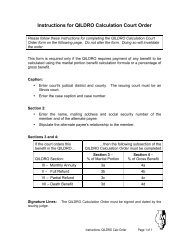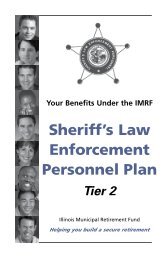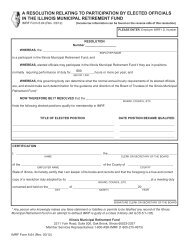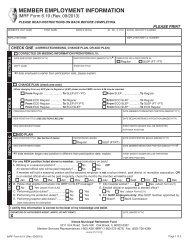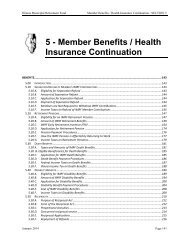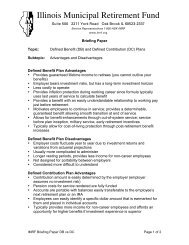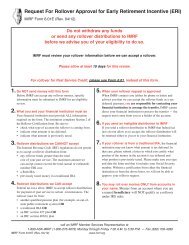Section 6 - IMRF
Section 6 - IMRF
Section 6 - IMRF
Create successful ePaper yourself
Turn your PDF publications into a flip-book with our unique Google optimized e-Paper software.
Limitation on Frequency<br />
• Employers may not adopt an Early Retirement Incentive (ERI) more frequently than once every five<br />
years after the close of a prior ERI.<br />
Exhibit 6KK<br />
Page 2 of 2<br />
• An ERI resolution adopting a program earlier than five years after the close of a prior ERI shall not be<br />
given effect by <strong>IMRF</strong>.<br />
• This requirement applies to ERI programs effective December 31, 2013, and thereafter.<br />
ERI cost estimates<br />
• When an employer submits the ERI resolution to <strong>IMRF</strong>, it should include a copy of the cost estimate for<br />
the period of the adopted ERI.<br />
• Contact your <strong>IMRF</strong> Field Representative to request a cost estimate. Your local Field Representative<br />
will be able to calculate the annual increased pension costs. The cost estimate will be completed at no<br />
charge to the employer.<br />
• If an employer submits the ERI resolution without a cost estimate:<br />
— <strong>IMRF</strong> will not implement the program, and<br />
— The employer will need to both conduct the cost estimate and adopt a second resolution.<br />
Dissolutions<br />
• If an employer is dissolving and its <strong>IMRF</strong> assets and liabilities will be transferred to:<br />
One successor unit of government—the dissolving employer must provide the ERI Cost Study to<br />
the successor, and the successor must also approve the ERI. A copy of the successor unit’s<br />
resolution approving the ERI must be available to <strong>IMRF</strong> upon request.<br />
More than one successor unit of government—the dissolving employer must provide the ERI Cost<br />
Study to each successor, and a majority of the successors must approve the ERI. Copies of the<br />
successor units’ resolutions approving the ERI must be available to <strong>IMRF</strong> upon request.<br />
No successor unit of government and the law does not specify responsibility for the <strong>IMRF</strong> assets<br />
and obligations—the <strong>IMRF</strong> Board of Trustees must approve the ERI.<br />
• If a dissolving employer submits the ERI resolution without approval by successor unit(s) of local<br />
government or without a request for <strong>IMRF</strong> Board of Trustee approval when no successors exist, <strong>IMRF</strong><br />
will not implement the ERI program.<br />
• If <strong>IMRF</strong> is unaware that these requirements were not met and pays an ERI enhanced pension to a<br />
member who:<br />
—Retired at age 55 or older under Regular Tier 1 (age 50 for SLEP and SLEP ECO) or at age 62 or<br />
older under Regular Tier 2, the member will lose the ERI enhancements and be required to pay<br />
<strong>IMRF</strong> the difference between the ERI enhanced pension and the pension he or she would have<br />
received without the ERI—less the amount he or she paid for the ERI.<br />
—Retired at less than age 55 under Regular Tier 1 or less than age 62 under Regular Tier 2, the<br />
member will be required to repay <strong>IMRF</strong> for all pension payments received—less the amount paid for<br />
the ERI.<br />
Illinois Municipal Retirement Fund<br />
2211 York Road Suite 500 Oak Brook, IL 60523-2337<br />
Member Services Representatives 1-800-ASK <strong>IMRF</strong> (1-800-275-4673) Fax: (630) 706-4289<br />
www.imrf.org<br />
<strong>IMRF</strong> Form 6.77 (Rev. 04/2013) Page 2 of 2



